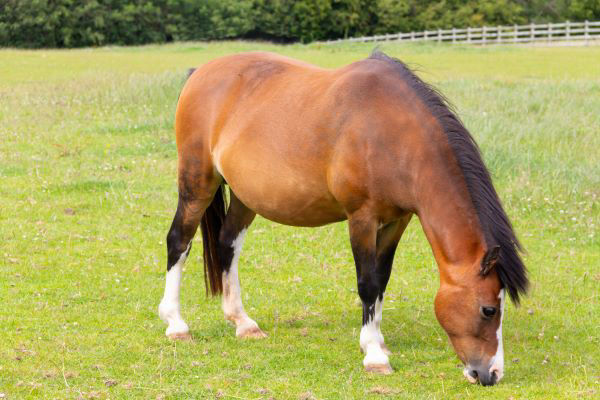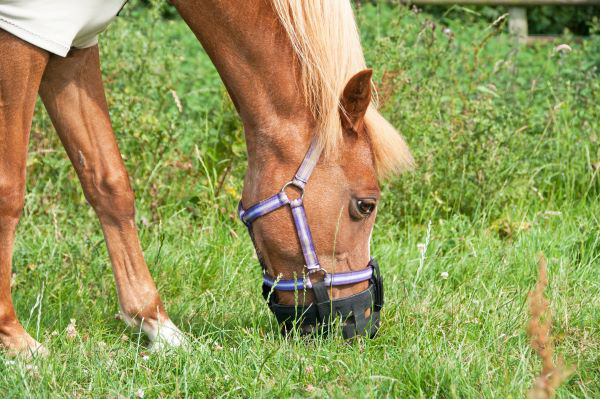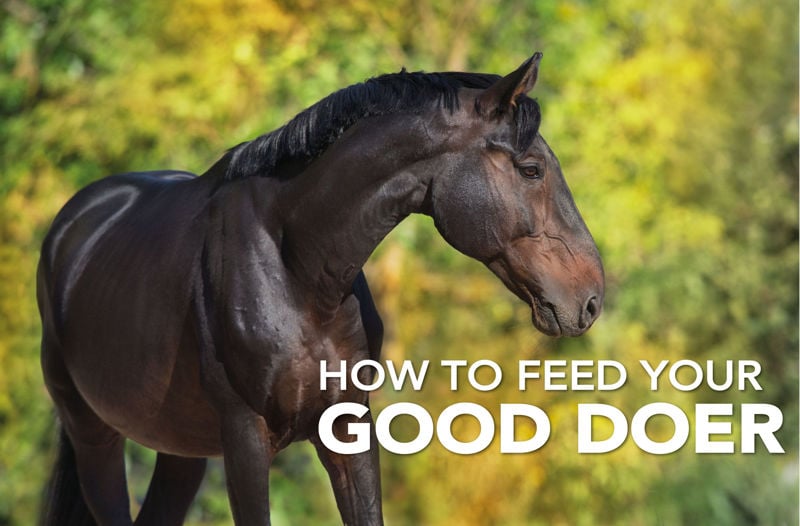Introduction
Good doers are defined as those that thrive without special attention. With over 50% of the UK’s population of horses being classed as overweight, it is clear that many of our horses fit into the category of being a ‘good doer’.
Managing these types of horses requires owners who are realistic and aware of what is required to keep a good doer at an ideal body weight to ensure the health and well-being of that individual horse. Managing good doers is hard work and keeping their weight in check is a constant requirement. Being overweight greatly increases the risk of the horse or pony suffering from painful and debilitating diseases such as laminitis and arthritis.
Removing elite performance horses from the equation and considering the types of horses and ponies left, which are generally considered to be either ‘leisure’ or companion animals, the figure of 50% becomes a lot greater as this population of horses are almost all overweight and carrying too much body condition.
Horse's natural body condition
Horses are free roaming, browsing animals and their metabolism is finely tuned in regard to seasonality. In the wild, horses browsed on 100’s of difference plants and herbs, walking miles every day to forage. In the spring and summer when food is abundant, the horse naturally gains weight and may even become overweight towards autumn time. This is a highly tuned way of ensuring survival over the winter when food is scarce and environmental temperatures drop. Over the winter months, the horse uses their body fat stores to keep warm and stay alive until spring comes with an increase in available food.
This process still happens in our modern-day horses; however, domestication and human intervention means that we do not allow this natural process to happen anymore. Whilst modern horses are exercised when their wild counterparts would not have been, modern horses are no longer free to roam and are housed or restricted to paddocks when turned out. Over-rugging and over-feeding in the winter also mean that horses are unable to utilise their natural metabolism over winter and are no longer losing any excess weight and are going into the next spring already heavier.

We are becoming accustomed to seeing our horses carrying more weight and body fat.
We as humans are becoming accustomed to seeing our animals – dogs and cats as well as horses – carrying more weight and body fat and are therefore less able to identify overweight animals as overweight is now becoming the norm. Owners also don’t like seeing their horses lose weight and whilst this is an issue for sick or elderly horses, weight loss over the winter months is normal and a healthy way of managing your horse's body weight effectively.
Workload
Being honest about your horse’s workload is the place to begin. Riders tend to overestimate how hard their horse is working particularly when it feels as though they are working harder than their horses. Overweight horses will have decreased energy levels and will be putting more strain on their joints.
A guide for the work level your horse is doing is:

Energy requirements
Knowing exactly how hard your horse is working will help to guide the calorie intake they require and allow you to adjust their feed and forage intake appropriately. A rough guide is:

Hay has an average energy content of 6MJ of digestible energy per kg, whereas grass has an energy content of 8-10MJ/kg on a dry matter basis. On a dry matter basis, a horse turned out on different pastures could eat:

N.B. these are average intakes based on research; actual intakes can vary between horses.
Grazing matters
Turning our horses out allows them to move around and mimics more of a natural way of feeding however, for good doers, more time in the field leads to more time eating. Modern pasture management has also led to grass varieties that are high in energy being used for horse grazing. A lot of ex-dairy pasture has been converted into grazing for horses and they do not require the same energy intakes. Pasture also contains much fewer grass varieties and doesn’t allow the horse to exhibit their natural browsing behaviours.
If your horse is turned out for 12 hours a day on good grazing, it could be eating 4kg (or more) of grass on a dry matter basis. Considering that this grass could provide 8-10MJ of digestible energy per kg this alone will be providing 32-40MJ DE which goes a good way towards their daily energy intake. If you are also feeding hay when your horses aren’t turned out it is very easy to meet (and even exceed) their daily energy requirements without extra feed. Restricting hay is harder as it is not recommended that a horse goes more than 2 hours without anything to eat. If your horse needs its calorie intake controlled, then reducing grass intake is a lot easier. This will allow you to feed enough hay when your horse is stabled.
Restricting grass intake via strip grazing methods or using a grazing muzzle will still allow for enough fibre and forage to pass through the horse’s gut to maintain digestive health. Using a grazing muzzle can reduce intakes by up to 80%, which works well for horses who have to be on a strict diet due to medical issues linked to obesity and weight gain.

Grazing muzzles can reduce your horse's grass intake by up to 80%.
Hard feed
If you have to manage a good doer, consider not only the forage that they are eating but also their hard feed. Does their workload warrant a big bucket feed or can you make some changes to help reduce their calorie intake?
For a horse or pony in light or zero work a vitamin and mineral supplement is usually a great idea. This will provide all the nutrients that they need in a very low-calorie form. Good doers on a forage-based diet will need a balancer or vitamin and mineral supplement of some form to ensure that they are getting the right amount of daily vitamins and minerals as forage alone will not provide everything that the horse needs.
Summary
Good doers, which make up a significant portion of the UK’s horse population, can struggle with weight management. Proper management is essential to avoid health risks like laminitis and arthritis, which are more common in overweight horses. Understanding your horse’s natural body condition, workload, and energy requirements is crucial for maintaining optimal weight. Restricting calorie intake through controlled grazing or using a grazing muzzle can help manage weight effectively. For horses with lower workloads, a vitamin and mineral supplement can provide the necessary nutrients without excess calories. Proper pasture management and mindful feeding are key to maintaining a healthy weight for good doers.
If you have any questions, or would like any further advice, please do not hesitate to contact our Registered Nutritionist, Stephanie Hyland, on 0880 585525, email [email protected], or drop us a message on social media.


